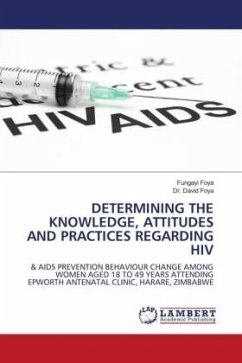
Family Planning Knowledge, Attitudes & Practices of Married Men
A Cross-sectional Study in Lusaka District, Zambia
Versandkostenfrei!
Versandfertig in 6-10 Tagen
27,99 €
inkl. MwSt.

PAYBACK Punkte
14 °P sammeln!
Family planning is a key component of reproductive health and is one of the effective interventions in reducing maternal and infant mortality. Despite family planning activities having started in the 1960s in Zambia, the contraceptive utilization rate is still unacceptably low and the unmet need for family planning among married women is high. The available family planning methods are poorly used due to several factors that include poor knowledge of each method and the perceived disapproval from husbands. Given the critical roles that Zambian men play in family decisions, men's support and inv...
Family planning is a key component of reproductive health and is one of the effective interventions in reducing maternal and infant mortality. Despite family planning activities having started in the 1960s in Zambia, the contraceptive utilization rate is still unacceptably low and the unmet need for family planning among married women is high. The available family planning methods are poorly used due to several factors that include poor knowledge of each method and the perceived disapproval from husbands. Given the critical roles that Zambian men play in family decisions, men's support and involvement are essential for family planning to become more widespread. If organized family planning programmes are to reach out to men, a better understanding of their reproductive intentions is essential. In this study, the author explores the knowledge, attitude and practice of family planning among married men of Lusaka District of Zambia. The factors that contribute towards their attitudeand practice have also been explored. These factors can be exploited by policy makers in order to improve family planning utilization in Zambia and other African countries.












